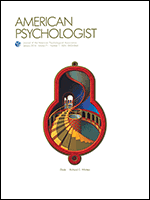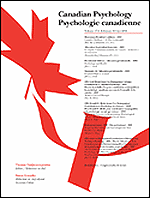
The American Psychological Association (APA) is the largest scientific and professional organization of psychologists in the United States, with over 146,000 members, including scientists, educators, clinicians, consultants, and students. It has 54 divisions—interest groups for different subspecialties of psychology or topical areas. The APA has an annual budget of around $125 million.

Applied psychology is the use of psychological methods and findings of scientific psychology to solve practical problems of human and animal behavior and experience. Educational and organizational psychology, business management, law, health, product design, ergonomics, behavioural psychology, psychology of motivation, psychoanalysis, neuropsychology, psychiatry and mental health are just a few of the areas that have been influenced by the application of psychological principles and scientific findings. Some of the areas of applied psychology include counseling psychology, industrial and organizational psychology, engineering psychology, occupational health psychology, legal psychology, school psychology, sports psychology, community psychology, neuropsychology, medical psychology and clinical psychology, evolutionary psychology, human factors, forensic psychology and traffic psychology. In addition, a number of specialized areas in the general area of psychology have applied branches. However, the lines between sub-branch specializations and major applied psychology categories are often mixed or in some cases blurred. For example, a human factors psychologist might use a cognitive psychology theory. This could be described as human factor psychology or as applied cognitive psychology. When applied psychology is used in the treatment of behavioral disorders there are many experimental approaches to try and treat an individual. This type of psychology can be found in many of the subbranches in other fields of psychology.

Clinical psychology is an integration of human science, behavioral science, theory, and clinical knowledge for the purpose of understanding, preventing, and relieving psychologically-based distress or dysfunction and to promote subjective well-being and personal development. Central to its practice are psychological assessment, clinical formulation, and psychotherapy, although clinical psychologists also engage in research, teaching, consultation, forensic testimony, and program development and administration. In many countries, clinical psychology is a regulated mental health profession.

Counseling psychology is a psychological specialty that began with a focus on vocational counseling, but later moved its emphasis to adjustment counseling, and then expanded to cover all normal psychology psychotherapy.

Health psychology is the study of psychological and behavioral processes in health, illness, and healthcare. The discipline is concerned with understanding how psychological, behavioral, and cultural factors contribute to physical health and illness. Psychological factors can affect health directly. For example, chronically occurring environmental stressors affecting the hypothalamic–pituitary–adrenal axis, cumulatively, can harm health. Behavioral factors can also affect a person's health. For example, certain behaviors can, over time, harm or enhance health. Health psychologists take a biopsychosocial approach. In other words, health psychologists understand health to be the product not only of biological processes but also of psychological, behavioral, and social processes.

American Psychologist is a peer-reviewed academic journal published by the American Psychological Association. The journal publishes articles of broad interest to psychologists, including empirical reports and scholarly reviews covering science, practice, education, and policy, and occasionally publishes special issues on relevant topics in the field of psychology. The editor-in-chief is Harris Cooper.

Cecil Randy Reynolds is an American psychology professor best known for his work in psychological testing and assessment.
The Journal of Abnormal Psychology is a peer-reviewed academic journal published by the American Psychological Association (APA). The journal has been in publication for over 110 years, and it is considered to be a "preeminent outlet for research in psychopathology". Beginning in 2022, the journal will be known as the Journal of Psychopathology and Clinical Science.

The Journal of Consulting and Clinical Psychology is a monthly academic journal published by the American Psychological Association. Its focus is on treatment and prevention in all areas of clinical and clinical-health psychology and especially on topics that appeal to a broad clinical-scientist and practitioner audience. The editor-in-chief is Joanne Davila.
Sexual and Relationship Therapy is a peer-reviewed, scholarly journal offering a multidisciplinary forum for review and debate in the field of sex and relationship therapies. The journal presents original research and best practice and is a vehicle for new theory, methodology, and application. The focus of the journal is international and interdisciplinary in nature, with a range of contributions from diverse places on the globe, and myriad disciplines like sex therapy, sexual medicine, psychology, sexology, family therapy, public health, sociology, counselling, and medical ethics. It is the official journal of the College of Sexual and Relationship Therapists (COSRT). The journal was established in 1986 under the title Sexual and Marital Therapy, and under its current title since 2000. The editor-in-chief is Dr. Markie Twist.
Rodney L. Lowman is an American psychologist, academic administrator and entrepreneur whose major contributions have been in the areas of career assessment and counseling, ethical issues in Industrial and Organizational Psychology, the integration of clinical psychology and I-O psychology and helping to develop the field of consulting psychology. In a study of the most prolific contributors to the Consulting Psychology Journal: Practice and Research, Lowman was rated the second highest contributor for articles for the period 1992–2007.

Psychology encompasses a vast domain, and includes many different approaches to the study of mental processes and behavior. Below are the major areas of inquiry that taken together constitute psychology. A comprehensive list of the sub-fields and areas within psychology can be found at the list of psychology topics and list of psychology disciplines.

Teaching of Psychology is a peer-reviewed academic journal focusing on psychology. The journal's editor is Andrew N. Christopher. It has been in publication since 1974 and is currently published by SAGE Publications in association with Division 2 of the American Psychological Association.
Measurement and Evaluation in Counseling and Development is a peer-reviewed academic journal that publishes papers in the field of Psychology. The journal's editor is Bradley Erford. It has been in publication since 2009 and is currently published by Taylor and Francis is association with Association for Assessment and Research in Counseling, a member association of the American Counseling Association.
Pediatric psychology is a multidisciplinary field of both scientific research and clinical practice which attempts to address the psychological aspects of illness, injury, and the promotion of health behaviors in children, adolescents, and families in a pediatric health setting. Psychological issues are addressed in a developmental framework and emphasize the dynamic relationships which exist between children, their families, and the health delivery system as a whole.

Canadian Psychology is a quarterly peer-reviewed academic journal published by the American Psychological Association on behalf of the Canadian Psychological Association. The journal was established in 1950 and publishes "articles in areas of theory, research, and practice that are potentially of interest to a broad cross-section of psychologists". The editor-in-chief is Vina Goghari.

Psychology and Psychotherapy: Theory, Research and Practice is a quarterly peer-reviewed medical journal covering research, assessment and treatment of psychopathologies. It is published by Wiley-Blackwell on behalf of the British Psychological Society and the editors-in-chief are Katherine Berry and Sandra Bucci. It was established in 1920 as The British Journal of Medical Psychology.
Terence J. G. Tracey is an American psychologist, author and researcher. He is professor emeritus of counseling and counseling psychology at Arizona State University. He is also a visiting professor at University of British Columbia. He has served in many administrative positions at Arizona State University including department head and associate dean. He is the former editor-in-chief of Journal of Counseling Psychology.
Rachel L. Navarro is a licensed counseling psychologist known for her work in the field of multicultural vocational psychology, focusing on the experience and career goals of Latinas in STEM fields. She is Professor of Counseling Psychology, Education, and Health and Behavior and Associate Dean for Research and Faculty Development at the University of North Dakota.








